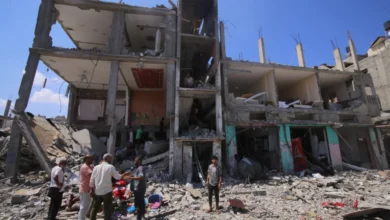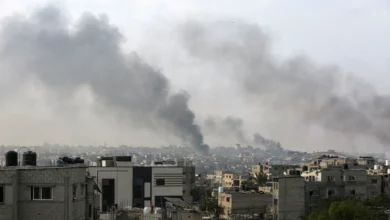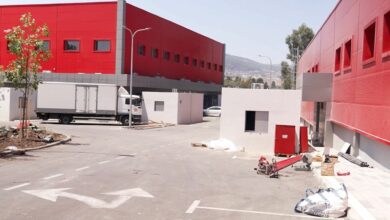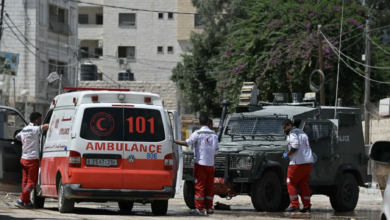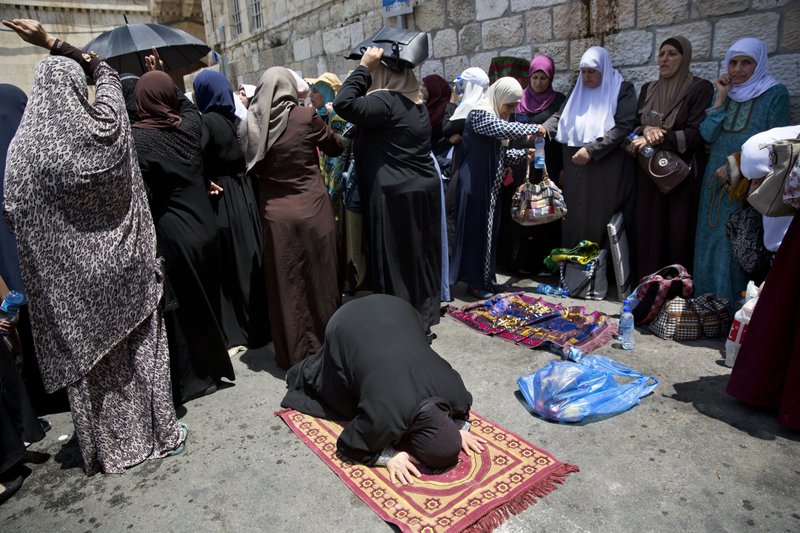
Zakariya al-Jawawdeh often visits the grave of his 16-year-old son Mohammed, watering plants and reciting a prayer. His trips to the cemetery, just a few steps from his home in Jordan’s capital of Amman, also stoke frustration that his son’s killer, an Israeli Embassy security guard, has not been held accountable.
The furniture store owner’s grievances are entangled in one of the most toxic diplomatic crises since Israel and Jordan signed a peace treaty in 1994, only Israel’s second with an Arab country.
The relationship — typically low-key, but strategically important — has been “hit hard” on all levels by the July 23 shooting, next to the Israeli Embassy complex in Jordan in which the Israeli guard also killed his middle-aged Jordanian landlord, said a Jordanian official.
Israel’s Foreign Ministry, which says the guard acted in self-defense after the teen attacked him with a screw driver, declined comment on potential damage to the relationship. Spokesman Emmanuel Nahshon said Israel will share the eventual results of an ongoing investigation with Jordan, but would not describe the type of inquiry under way.
Even during the current crisis, core elements of the relationship remain in place.
Security cooperation continues against shared enemies, such as Islamic extremist groups, but at a reduced level, said the Jordanian official, who spoke on condition of anonymity to avoid a further escalation of tensions.
A multi-million-dollar energy deal remains on track, with natural gas to start flowing from Israel to Jordan by early 2020, said Binyamin Zomer, the Israel country representative for the Noble Energy company. The level of bilateral trade, relatively low for years, has remained unchanged, according to the Manufacturers’ Association of Israel.
But other endeavors have suffered.
The third phase of a program to employ Jordanians in Israeli hotels — which would have raised the number of workers from 1,000 to 1,500 — is on hold, said Shabtai Shay, head of hotel association in Israel’s Red Sea resort of Eilat.
A conference on water and energy cooperation, scheduled for October in Jordan with the participation of Cabinet ministers from both countries, has been put off, said Gidon Bromberg, the Israeli co-director of EcoPeace Middle East, the organizer. A Jordanian delegation stayed away from Israel’s recent bi-annual conference on water technology, he said.
A sustained breakdown in communications on sharing water and energy sources, a national security interest for both countries, could have “terrible implications,” said Bromberg, whose group promotes cooperation between Jordanians, Palestinians and Israelis on water security.
Israeli Prime Minister Benjamin Netanyahu has been assigned much of the blame for the diplomatic crisis, because of his handling of the shooting aftermath.
The shooting came amid tensions over a Muslim-administered Jerusalem holy site that is revered by Muslims and Jews. In mid-July, Arab gunmen killed two Israeli policemen near the site, prompting Israel to install metal detectors there. The decision triggered Muslim protests, including by Jordan, the site’s Muslim custodian, which viewed it as Israeli encroachment.
Ten days into the controversy, Mohammed al-Jawawdeh delivered bedroom furniture to a building owned by the Jordanian landlord of the Israeli guard.
Jordanian security officials said at the time that an argument ensued and that the teen attacked the guard with a screw driver. The guard, who was lightly hurt, opened fire, killing the teen and severely wounding the landlord who stood nearby and later died of his injuries.
The following day, after a phone call between Netanyahu and Jordan’s King Abdullah II, Jordan allowed the guard to leave under the cover of diplomatic immunity, while Israel removed the metal detectors in an apparent tradeoff.
What came next infuriated the Jordanians.
Two days after the fatal shooting, Netanyahu praised the guard in a hero’s welcome at the prime minister’s office. Netanyahu told the guard he had acted “calmly” and that he was “happy that things ended the way they did.”
Jordan’s monarch promptly slammed Netanyahu for “provocative” behavior, accusing him of trying to score political points in Israel, where the prime minister was being criticized for his handling of the metal detector controversy.
Since then, Jordan has told Israel that the Israeli ambassador — who had returned to Israel along with the guard and other embassy staff — would not be welcome back and that the relationship would continue to suffer unless Israel launched a proper legal inquiry into the shootings.
It marks the first time since 1994 that Israel does not have a top diplomat present in Jordan, said Oded Eran, a former Israel ambassador to the kingdom. Eran said that “most of the damage could have been averted” if Netanyahu had refrained from his televised, back-slapping welcome of the guard.
“The relations between Jordan and Israel were affected certainly on the highest level, that is to say between the prime minister of Israel and the king of Jordan,” said Eran, who served in Jordan during another tense period, in 1997, when Netanyahu authorized the ultimately failed attempt to assassinate a leader of the Islamic militant group Hamas in Jordan.
The current crisis is a “serious hiccup,” he said, adding that shared interests over security, water and energy may prove stronger in the end.
Wider diplomatic interests of both countries could be harmed by a continued standoff.
Netanyahu’s troubles with Jordan will make it more difficult for him to promote the idea of a “regional peace,” based on purportedly improved ties, both open and hidden, with Arab states. In this model, closer cooperation with Arab neighbors would precede any deal with the Palestinians.
Such a deal seems increasingly remote, despite declarations by the Trump administration that it is working on a new peace initiative. Netanyahu has further hardened positions, saying in recent weeks that Israel will not uproot Jewish settlements in the occupied West Bank, which Palestinians seek as a centerpiece of a future state.
Jordan, meanwhile, prizes its role as Mideast mediator, which is currently being overshadowed by Egypt’s high-profile involvement in brokering a reconciliation deal between rival Palestinian camps, with Israel’s tacit backing.
Domestically, the relationship with Israel remains widely unpopular in Jordan, where a majority of the population is of Palestinian origin. Such sentiments were inflamed by the embassy shooting at a time of growing dissatisfaction among Jordanians over a worsening economy, said Hind al-Fayez, a former Jordanian parliament member.
If Jordan’s leaders won’t abrogate the peace treaty, they must at least ensure justice for the two slain Jordanians, she said.
Al-Jawawdeh, the bereaved father, dismissed the possibility that his son had carried out a politically motivated attack, describing him as an ordinary teen.
The 44-year-old said he wants Israel to put the guard on trial, so that “Jordanians don’t feel weak and say they are losing their rights in their own country.”
___

